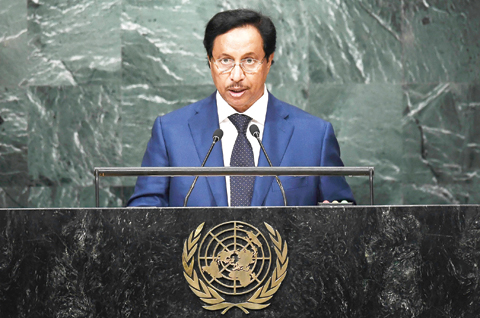
Manama: Kuwait has strongly condemned the intentional targeting of populated areas, civil and medical facilities, as well as indiscriminate bombardment and dropping of barrel bombs on the Syrian people.
Kuwait also demands that all those responsible for war crimes and crimes against humanity be brought to international justice, Prime Minister Shaikh Jaber Mubarak Al Hamad Al Sabah said as he addressed the UN General Assembly on Wednesday.
The conflict in Syria, which broke out in March 2011, has killed more than 250,000 people and injured many more, and the situation has been gravely deteriorating with the bombing of populated areas from the warring parties, forcing 13 million people to flee for safe havens, making the Syrian people the largest refugee community in the world.
“We follow with concern the continuing crisis, with worsening conditions all over the country," Shaikh Jaber said, adding that Kuwait has rushed to help the needy Syrian people and hosted three international donor conferences where combined pledges exceeded $7 billion, including $1.3 million from Kuwait.
The bulk of the Kuwaiti contributions went to specialized UN agencies, inter-governmental and NGOs helping the Syrian people inside the country or in refugee camps in other nations.
In his address, Shaikh Jaber said that Kuwait rejected all forms of terrorism and reaffirmed the country’s active contributions to the international coalition fighting the Daesh terror group, Kuwait News Agency (Kuna) reported.
“Kuwait condemns terrorist acts in all their forms and manifestations, as well as its total rejection of all acts of violence and extremism, that contravene international laws and norms, as well as the teachings of the true religion of Islam, and all other divine religions, in addition to cultural and human values," he said.
Odious phenomenon
Terrorism was thriving in conflict zones because of failure to solve these conflicts, he said.
"It is therefore, incumbent upon us to recognise that combating this odious phenomenon is an international responsibility, and no one country by itself, no matter how much it tries, can confront or eliminate it," he said.
He insisted that it was morally impermissible to link this phenomenon to any nationality, religion or civilization.
As part of its efforts to fighting the menace of terrorism, Kuwait contributed effectively to providing support to international efforts to combat Daesh in Iraq.
Kuwait has also been fighting terrorism domestically with threats surfacing frequently but the security authorities were thwarting these plots.
Regarding the situation in Yemen, Shaikh Jaber said Kuwait remained fully committed to the UN-brokered political solution in Yemen in line with the Gulf Cooperation Council (GCC) initiative and its implementation mechanism, UN Resolution 2216 and Yemen’s national dialogue outcome.
Referring to the ties with Tehran, Shaikh Jaber said he looked forward to relations of friendship and cooperation with Iran based on mutual respect and understanding, and emphasized the importance of creating the appropriate conditions for any constructive dialogue to take place, in accordance with the rules and norms of international law, relating to the principle of good neighbourly relations, respect of sovereignty of states, and non-interference in their internal affairs.
The Kuwaiti prime minister called for an end to the occupation of the three Emirati islands, and for a response to the endeavours of the United Arab Emirates to resolve the issue through direct negotiations or by resorting to the International Court of Justice in The Hague.











